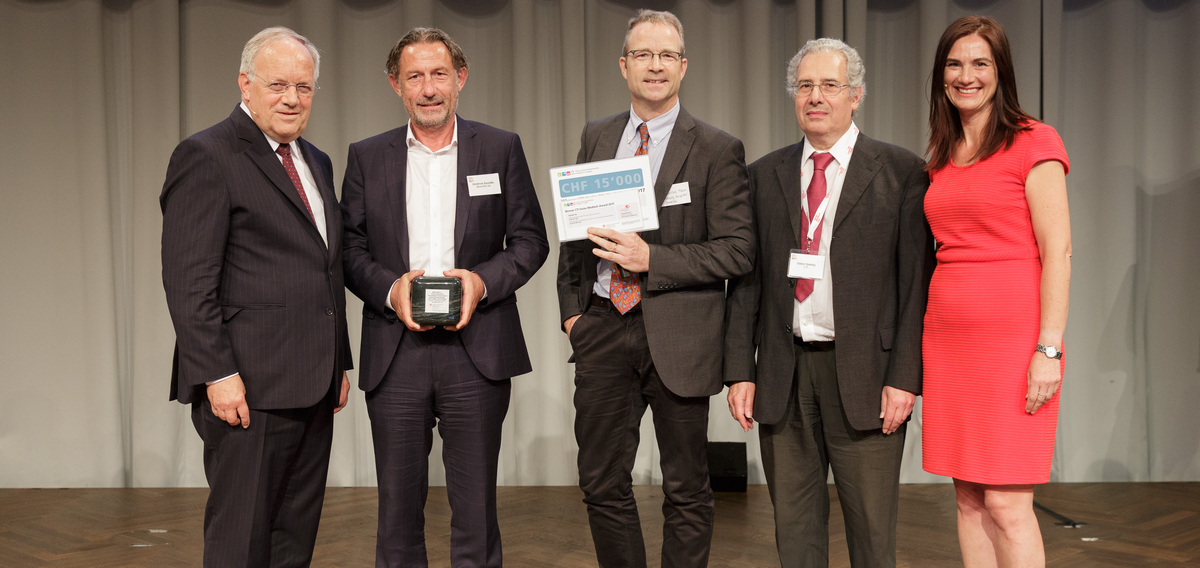
600 guests gathered yesterday at the Swiss Medtech Day in Berne. MaxiVAX and the Geneva University Hospitals received the CTI Swiss Medtech Award 2017. 4Quant won the Science Slam. And Eric Amble one of the most active investors in the life science field provided important tips for start-ups.
This was the second time since 2016 that the Swiss Medtech Day has been held under the sponsorship of the CTI, Medical Cluster and FASMED, the latter two having merged to form the association Swiss Medtech on 12 June of this year. The event provides the biggest platform for industry, trade, research and start-ups in the medical technology sector. Highlights include the award ceremony of the CTI Swiss Medtech Award, the Science Slam and keynotes.
CTI Swiss Medtech Award for personalised cancer immunotherapy
The 2017 CTI Swiss Medtech Award has gone to the biotech company MaxiVAX and the Geneva University Hospitals. Federal Councillor Johann N. Schneider-Ammann and Gábor Székely, CTI board member and head of CTI Medtech, presented Dr Dimitri Goundis of MaxiVAX SA and Prof. Nicolas Mach of the Geneva University Hospitals with the award and a cheque for CHF 15,000 (picture above). “All three nominated project teams were worthy of the prize. Their ideas and developments are driving progress in their sector and are helping to make medical technology an important industry in the Swiss economy,” said Mr Schneider-Ammann in his speech paying tribute to the nominated start-ups. The winning project was selected live by the 600 or so representatives of medtech research and the medtech industry who attended Swiss Medtech Day 2017.
MaxiVAX’s novel Immuno-Oncology therapeutic vaccination is based on triggering the patient’s own natural immune response mechanism via an innovative and proprietary technology in order to eliminate cancer cells. MVX-ONCO-1 is a product that contains two distinct biological entities:
1) Vaccine: administered by sub-cutaneous injection, using the patient’s own irradiated cancer cells as vaccine antigens, with a key benefit of using the entire set of tumor antigens from the patient’s own cells.
2) Immune boosting agent: an immune boosting agent is delivered at the site of vaccination in a sustained manner, via genetically reprogrammed cells, encapsulated in a small biocompatible capsule. Two capsules, which are essential to protect the GM-CSF producing cells, are placed underneath the skin at the same site as the vaccine injection.
Studies show that the treatment is safe, well-tolerated and effective, particularly in patients with a fairly robust immune system. The vaccine MVX-ONCO-1 is now being tested on 40 head or neck cancer patients in a trial conducted in four or five hospitals. “MVX-ONCO-1 is personalised medicine and has the potential to fight all types of cancer,” says Dr Dimitri Goundis, CEO of MaxiVAX. The company is currently testing further effects of the new treatment and is looking into working with large pharmaceutical companies.
4Quant winner of the Science Slam
In the science slam, eight team from academia and several companies presented their projects in a three-minute pitch. The winner was also selected by the audience. The award went to the start-up 4Quant for LungStage. LungStage is an integrated Software application for radiologists and nuclear medicine physicians assessing lung cancer based on combined PET/CT scans. The solution calculates the tumor stage automaticallv and provides classification of malignant tumors with confidence intervals as second opinion for the physician. These results are based on a clearly traceable quantitative analysis of clinically meaningful imaging biomarkers. LungStage accelerates the staging of non-small cell lung cancer (NSCLC) and helps to increase the staging-quality.
Advice by an experienced investor
One of the keynote speakers was Eric Amble, Founder and Managing Partner NeoMed. Neomed invests in biotech- and medtech companies. The portfolio includes or included several Swiss companies such as Actelion, Endosense or Sequana Medical. In total, Neomed has invested EUR270 million in the last 20 years.
Eric Amble provided several tips for ambitious medtech start-ups:
- The average return for an investor is clearly higher when a start-up is sold before the commercialisation phase. Entrepreneurs should therefore think about early exits and should be aware of the fact that it is very hard to raise money for commercialisation.
- Start-ups should engage in business development earlier. They should talk earlier to big companies about partnerships and / or investments. Another possibility is to outlicense rights to players in distant markets. Collaborations are not only attractive because of the money. Start-ups can also build up a network of partners.
- Early stage companies should only concentrate on proof of principle and should outsource everything else. This is easy in Switzerland with the huge number of experienced service companies in the medtech industry.























































Please login or sign up to comment.
Commenting guidelines